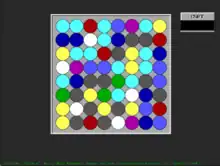Shariki
Shariki (Russian: Ша́рики, "The Marbles") is a puzzle video game written in 1994 for MS-DOS by Russian developer Eugene Alemzhin. The goal of the game is to gain progressively higher scores by matching three or more balls of the same color in a line (vertical or horizontal), by swapping adjacent balls. Each swap must result in a match. Matched balls are then removed, and new ones drop from the top to fill the gaps. The game is over when no more matches are possible in the game field.
| Shariki | |
|---|---|
 Game screen. The Russian счет (sčot) means "score," while the green text at the bottom translates as "Program "Shariki". Author Zhenya Alemzhin. Write letters: sandra@sandra.kemerovo.ru. Hello everyone!" | |
| Developer(s) | Eugene "Zhenya" Alemzhin |
| Platform(s) | MS-DOS, Windows |
| Release | 1994 |
| Genre(s) | Puzzle |
| Mode(s) | Single-player |
Legacy
Shariki proved to be influential and eventually many games that closely matched its mechanics arose.[1] Collectively known as tile-matching video games or match-three games, these all revolve around the mechanic of creating a three-in-a-row line of identical pieces. They include:
- Bejeweled (2001) by PopCap Games
- Jewel Quest (2004) created and published by iWin
- Puzzle Quest: Challenge of the Warlords (2007) developed by Infinite Interactive and published by D3 Publisher
- Aurora Feint (2008) game for the iPhone and iPod Touch
- Candy Crush Saga (2012)
- Pokémon Shuffle (2015) game for the Nintendo 3DS handheld console
References
- "Shariki on Casual Games Wiki". Archived from the original on 2010-01-12. Retrieved 2008-11-13.
External links
- Article Shariki: The Predecessor of Bejeweled and Puzzle Quest
- Museum of Shariki games (in Russian)
- Play Shariki at the Internet Archive